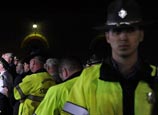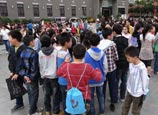
IV. On Racial Discrimination
The long-existing racial discrimination prevalent in the U.S. society sees no improvements, and ethnic minorities do not enjoy equal political, economic and social rights.
Ethnic Americans' rights to vote are limited. During the presidential election in November 2012, some Asian-American voters were obstructed at voting stations and received with discriminations (The China Press, November 8, 2012). The United Nations Human Rights Council Special Rapporteur used to lodge a joint accusation against the U.S. of failing to fully guarantee the rights to vote of African-Americans and Hispanics. The January/February 2013 edition of the Boston Review reported that as of 2010, more than 5.85 million American citizens were disenfranchised because of criminal convictions, and more than two million African-Americans currently are stripped of their right to vote. The U.S. attorney general also acknowledged, as the rights to vote of some ethnic Americans were restricted by laws requiring proof of identity, some people are as a matter of fact stripped of such rights (The Guardian, May. 30, 2012).
Ethnic Americans are discriminated against in the job market, and their economic well-being worsens as a result. According to statistics from the U.S. Department of Labor, the unemployment rate of whites was registered 7.0 percent in Oct. 2012, 14.3 percent for African-Americans and 10.0 percent for Hispanics. The average period of unemployment for ethnic minorities is notably longer than that for whites. Asians are unemployed on average for 27.7 weeks, African-Americans for 27 weeks (Desert News, December 4, 2012). According to data from the federal Labor Department, over half of all African-Americans and non-Hispanic blacks in New York city, who were old enough to work, had no jobs in 2012, and it takes them almost a full year on average to find another job (Madame Noire, June 21, 2012). Employment discrimination is the main reason behind income disparity and poverty. According to statistics released by the U.S. Census Bureau on September 12, 2012, the median household income for African-Americans was 32,229 U.S. dollars in 2011, less than 60 percent of that of non-Hispanic whites; and the poverty rate for African-Americans stood at 27.6 percent, almost three times of that of non-Hispanic whites.
Racial discrimination is rampant in the field of law enforcement and justice. The Reuters website reported on July 3, 2012, police tend to be more lenient to whites. Out of more than 685,000 police stops in New York City in 2011, more than 85 percent of the stopped were black or Hispanic. Ethnic Americans are often offended by law enforcement authorities. A 21-year-old black man in Arkansas was searched and put into a police car, and later was found shot in the head while handcuffed (www. telegraph.co.uk, August 8, 2012). The incidence where a 28-year-old black man, Mohamed Bah, was shot dead by New York police outraged the black community (NYDailyNews.com, September 26, 2012). An article on the website of Texas Civil Rights Project on July 24, 2012 said the Austin police' excessive use of force had led to two fatal police shootings of minority suspects since 2011. The president of the Texas Civil Rights Project said that the shooting death of a dog even received more thorough and careful investigation than the death of a black victim. The New York Times columnist Charles M. Blow wrote an article on January 14, 2013, saying "the idea that progress toward racial harmony would or should be steady and continuous is fraying. And the pillars of the institution -- the fundamental devaluation of dark skin and strained justifications for the unconscionable -- have proved surprisingly resilient."
Religious discrimination is rapidly on the rise, with an increase in insults and attacks against Muslims. Muslims account for less than one percent of the U.S. population, but are involved in 14 percent of religious discrimination cases under investigation of the federal government, and 25 percent of employment-related discrimination cases (www. sinovision.net, March 29, 2011). In September, 2012, a U.S. film director made a film that is insulting to the Prophet Muhammad and posted it online, which triggered waves of protests in the Muslim world. In Houston, a dead pig was left in front of a mosque (abclocal.go.com, December 5, 2012). The U.S. Navy special operations force was reported to use images of gun-holding Muslim women as training targets (www.nydailynews.com, July 3, 2012). The 57-year-old Muslim, Bashir Ahmad, was stabbed and bitten outside a Mosque by a suspect who shouted anti-Muslim expletive during the attack (Wall Street Journal, November 19, 2012). Since the September 11 attacks, the U.S. Justice Department has investigated more than 800 incidents of violence, vandalism and arson against people believed to be Muslim, Arab or South Asian (www. reuters.com, March 29, 2011).
Apartheid in fact still exists in the American society. New York Times reported on August 6, 2012 that, the proportion of non-Hispanic black residents on the Upper East Side is only 2.7 percent, and whites 81 percent. Local co-op boards can reject black buyers without giving a reason, and some Upper East Side co-ops have a reputation for rejecting black buyers. A study found that the New York area was the second most segregated for black people and the third most segregated for Hispanic and Asian residents. A superintendent of NASA Real Estate Corporation was sued for refusing to show three African-Americans any openings, claiming no apartments were available for rent, but showing vacancies to white individuals who inquired about the same apartments less than an hour after turning down black renters, saying, "You look like nice people. That's why I show you." (queenscourier.com, December 12, 2012) Furthermore, studies found a rising tide of apartheid in the U.S. workplace. Nineteen out of the 58 surveyed industries showed a trend toward racial re-segregation between white men and black men (www.washingtonpost.com, October 25, 2012).
Racial relationship is in tension, and hate crimes take place frequently. The Associated Press reported on October 28, 2012, citing a latest poll, that 51 percent of Americans now express explicit anti-African-American attitudes, three percentage points higher than in 2008. The abc.go.com reported on November 19, 2012, three shop owners of Middle Eastern descent were shot dead in four months in Brooklyn, New York, and the police cannot rule out the possibility of the homicides being racially motivated. Two young white men from Mississippi killed a black man by running a truck over him. The two, since 2011, have frequently assaulted and attacked African-Americans in and around Jackson, Mississippi, using beer bottles, sling shots and motor vehicles, and they often bragged about their exploits (Reuters, December 5, 2012). A white gunman named Wade Michael Page killed six Sikh worshippers at their temple, and his motivation was linked to neo-Nazi propaganda, and he was suspected to be a white supremacist (edition. cnn.com, August 10, 2012).
Native Americans' rights are not properly guaranteed. In 2012, the United Nations Human Rights Council Special Rapporteur on racism, Mutuma Ruteere, pointed out Navajos, a branch of Native Americans, faced racial discrimination, including the lack of access to justice and legal remedies (United Nations document number A/67/328). United Nations Human Rights Council Special Rapporteur on the rights of indigenous people, James Anaya, said the ability of Native Americans to use and access their sacred places is often curtailed by mining, logging, hydroelectric and other development projects. He cited research figures of relevant institutions, saying Native Americans' poverty rates nearly double the national average, and their life expectancy is 5.2 years less than the national average. Thirteen percent of Native Americans hold a basic university degree, much lower than the national average, 28 percent. Indigenous women are more than twice as likely as all other women to be victims of violence and one in three of them will be raped during her lifetime (United Naitons document number A/HRC/21/47/Add.1).
The rights of illegal immigrants are violated. Deaths often occur in immigration detention centers. United Nations Human Rights Council Special Rapporteur Christof Heyns said in his report that deaths occurred in prison-like conditions where detention was neither necessary nor appropriate, and where no proper medical care was provided (United Nations document number A/HRC/20/22/Add.3). U.N human rights experts and South Florida Haitian rights advocates call for the U.S. to suspend all deportations to Haiti, saying the deportations may constitute a human rights violation, and may place the Haitians in a life-threatening position (The Miami Herald, June 6, 2012).



















 Baby born right after earthquake in SW China
Baby born right after earthquake in SW China


![]()
